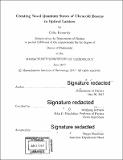Creating novel quantum states of ultracold bosons in optical lattices
Author(s)
Kennedy, Colin (Colin Joseph)
DownloadFull printable version (34.08Mb)
Other Contributors
Massachusetts Institute of Technology. Department of Physics.
Advisor
Wolfgang Ketterle.
Terms of use
Metadata
Show full item recordAbstract
Ultracold atoms in optical lattices are among the most developed platforms of interest for building quantum devices suitable for quantum simulation and quantum computation. Ultracold trapped atoms are advantageous because they are fundamentally indistinguishable qubits that can be prepared with high fidelity in well-defined states and read-out with similarly high fidelities. However, an outstanding challenge for ultracold atoms in optical lattices is to engineer interesting interactions and control the effects of heating that couple the system to states that lie outside the Hilbert space we wish to engineer. In this thesis, I describe a series of experiments and theoretical proposals that address several critical issues facing ultracold atoms in optical lattices. First, I describe experiments where the tunneling behavior of atoms in the lattice is modified to make our fundamentally neutral particles behave as though they are charged particles in a magnetic field. We show how engineering this interaction creates intrinsic degeneracy in the single particle spectrum of the many-body system and how to introduce strong interactions in the system with the goal of producing exotic many-body states such as a bosonic fractional quantum Hall states. Then, I discuss how this technique can be easily generalized to include spin and higher spatial dimensions in order to access a rich variety of new physics phenomena. Next, I report on the realization of a spin-1 Heisenberg Hamiltonian which emerges as the low energy effective theory describing spin ordering in the doubly-occupied Mott insulator of two spin components. This integer spin Heisenberg model is qualitatively different from the half-integer spin model because it contains a gapped, spin-insulating ground state for small inter-spin interaction energies which we call the spin Mott. Using a spin-dependent lattice to control the inter-spin interactions, we demonstrate high-fidelity, reversible loading of the spin-Mott phase and develop a probe of local spin correlations in order to demonstrate a spin entropy below 0.2 kB per spin. Progress on adiabatically driving the quantum phase transition from the spin Mott to the xy-ferromagnetic is discussed along with the progress towards the creation of a quantum gas microscope for single atom detection and manipulation..
Description
Thesis: Ph. D., Massachusetts Institute of Technology, Department of Physics, 2017. Cataloged from PDF version of thesis. Includes bibliographical references (pages 249-263).
Date issued
2017Department
Massachusetts Institute of Technology. Department of PhysicsPublisher
Massachusetts Institute of Technology
Keywords
Physics.